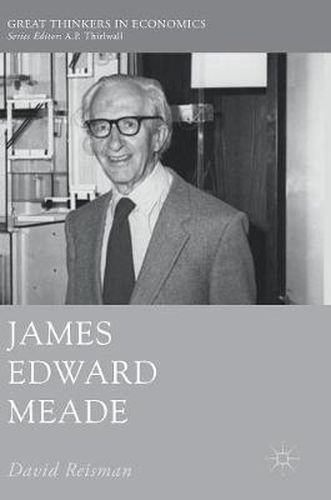Readings Newsletter
Become a Readings Member to make your shopping experience even easier.
Sign in or sign up for free!
You’re not far away from qualifying for FREE standard shipping within Australia
You’ve qualified for FREE standard shipping within Australia
The cart is loading…






This title is printed to order. This book may have been self-published. If so, we cannot guarantee the quality of the content. In the main most books will have gone through the editing process however some may not. We therefore suggest that you be aware of this before ordering this book. If in doubt check either the author or publisher’s details as we are unable to accept any returns unless they are faulty. Please contact us if you have any questions.
This book reviews James Meade’s prolific contribution to economics and its lasting impact. Few economists have written so much and on so many different topics. Meade was awarded the Nobel Prize in Economics in 1977 (jointly with Bertil Ohlin) for his contribution to international economics, but could just as easily have been awarded this for his contribution to the economics and politics of the managed economy. His commitment to the middle ground, neither free market nor command, runs through the whole of his published work, from Planning and the Price Mechanism in the shadow of post-war rationing to The Intelligent Radical’s Guide to Economic Policy and Full Employment Regained? when inflation combined with stagnation reopened the debate between the monetarists and the Keynesians. Meade was active in politics, most prominently in the debates in the 1960s about the European Economic Community and in the 1980s on the formation of Britain’s Social Democratic Party. As a person, he can best be described as a cultured Englishman, quiet and open, much in the mould of Coase, Mirrlees or Hicks.
This book draws upon the whole of Meade’s published work. It incorporates insights from unpublished papers and surviving correspondence kept at the London School of Economics and Political Science as well as interviews with family members and associates. The book will be of interest to economists but also to the students of politics and philosophy that Meade himself would have wanted to reach.
$9.00 standard shipping within Australia
FREE standard shipping within Australia for orders over $100.00
Express & International shipping calculated at checkout
This title is printed to order. This book may have been self-published. If so, we cannot guarantee the quality of the content. In the main most books will have gone through the editing process however some may not. We therefore suggest that you be aware of this before ordering this book. If in doubt check either the author or publisher’s details as we are unable to accept any returns unless they are faulty. Please contact us if you have any questions.
This book reviews James Meade’s prolific contribution to economics and its lasting impact. Few economists have written so much and on so many different topics. Meade was awarded the Nobel Prize in Economics in 1977 (jointly with Bertil Ohlin) for his contribution to international economics, but could just as easily have been awarded this for his contribution to the economics and politics of the managed economy. His commitment to the middle ground, neither free market nor command, runs through the whole of his published work, from Planning and the Price Mechanism in the shadow of post-war rationing to The Intelligent Radical’s Guide to Economic Policy and Full Employment Regained? when inflation combined with stagnation reopened the debate between the monetarists and the Keynesians. Meade was active in politics, most prominently in the debates in the 1960s about the European Economic Community and in the 1980s on the formation of Britain’s Social Democratic Party. As a person, he can best be described as a cultured Englishman, quiet and open, much in the mould of Coase, Mirrlees or Hicks.
This book draws upon the whole of Meade’s published work. It incorporates insights from unpublished papers and surviving correspondence kept at the London School of Economics and Political Science as well as interviews with family members and associates. The book will be of interest to economists but also to the students of politics and philosophy that Meade himself would have wanted to reach.